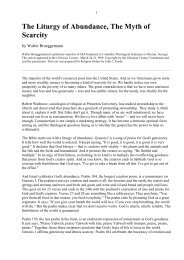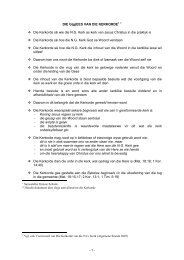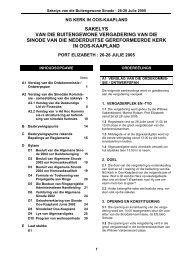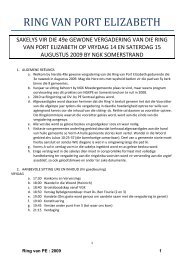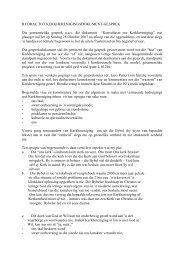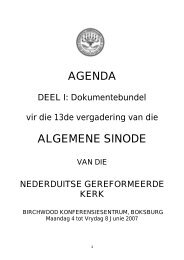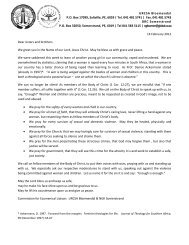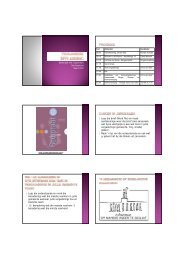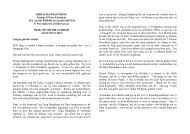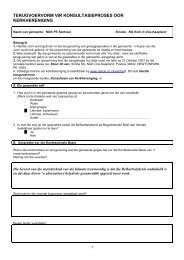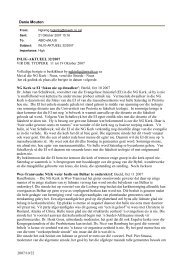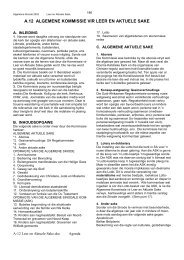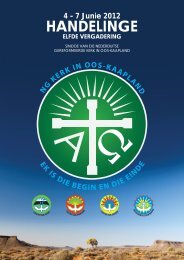BelharBelydenis - NG Kerk in Oos-Kaapland
BelharBelydenis - NG Kerk in Oos-Kaapland
BelharBelydenis - NG Kerk in Oos-Kaapland
You also want an ePaper? Increase the reach of your titles
YUMPU automatically turns print PDFs into web optimized ePapers that Google loves.
Artikel 4<br />
In hierdie artikel word geloof <strong>in</strong> die drieenige<br />
God (art 1), die eenheid <strong>in</strong> die kerk<br />
(art 2) en versoen<strong>in</strong>g <strong>in</strong> kerk en samelew<strong>in</strong>g<br />
(art 3) verder geneem na geregtigheid en<br />
vrede. Die artikel bely eers oor God <strong>in</strong> wie<br />
geregtigheid woon, dan oor die kerk wat<br />
hierdie geregtigheid - <strong>in</strong> navolg<strong>in</strong>g van God<br />
– prakties <strong>in</strong> die wêreld moet uitleef.<br />
Deut 32:4; Luk 2:14; Joh 14: 27; Ef 2:14;<br />
Jes 1:16-17; Jak 1:27; Jak 5:1-6; Luk<br />
1:46-55; Luk 6:20-26; Luk 7:22; Luk<br />
16:19-31<br />
Ons glo dat God Homself geopenbaar het<br />
as die Een wat geregtigheid en ware<br />
vrede onder mense wil br<strong>in</strong>g;<br />
Hoe maak God Homself bekend? Natuurlik<br />
<strong>in</strong> die Bybel. Hoe lyk hierdie God van die<br />
Bybel? Ons lei dit af uit Sy dade. “Hy is die<br />
Rots, sy werk is volmaak, alles wat Hy<br />
doen, is regverdig. Hy is die getroue God,<br />
sonder onreg, Hy is regverdig en<br />
betroubaar” (Deut 32:4, klem <strong>in</strong>gevoeg). In<br />
God is geen onreg nie. Daarom kan Hy ook<br />
nie onreg verdra of oogluikend toelaat nie.<br />
Oor Jesus, gebore <strong>in</strong> Betlehem, s<strong>in</strong>g die<br />
engele van vrede op aarde (Luk 2:14). Dis<br />
wat Jesus <strong>in</strong> sy laaste onderwys<strong>in</strong>g ook leer:<br />
“Vrede laat Ek vir julle na…”, en dis wat<br />
Efesiërs 2:14 oor die nuwe mensheid bely:<br />
“Christus is ons vrede…”<br />
God wil hierdie geregtigheid en vrede onder<br />
mense tot stand br<strong>in</strong>g.<br />
dat Hy <strong>in</strong> 'n wêreld vol onreg en<br />
vyandskap op 'n besondere wyse die<br />
God van die noodlydende, die arme en<br />
die veronregte is en dat Hy sy kerk roep<br />
om Hom hier<strong>in</strong> na te volg;<br />
Hoe br<strong>in</strong>g God nou hierdie reg en vrede<br />
(shalom as kosmiese vrede) tot stand <strong>in</strong> ‘n<br />
wereld vol van onreg en onvrede?<br />
Deur <strong>in</strong> situasies van onreg vir reg te kies.<br />
Deur onvrede <strong>in</strong> vrede en heelmak<strong>in</strong>g te laat<br />
verander. Waar mense dus swaarkry of arm<br />
is weens onreg <strong>in</strong> sisteme en die<br />
samelew<strong>in</strong>g, is God vir hulle op ‘n<br />
besondere manier daar: “Hy laat reg<br />
geskied aan verdruktes en gee brood aan<br />
dié wat honger ly. Hy beskerm die<br />
vreemdel<strong>in</strong>ge en help weesk<strong>in</strong>ders en<br />
weduwees, maar Hy versper die pad vir die<br />
goddelose”, s<strong>in</strong>g Israel <strong>in</strong> Psalm 146. En<br />
hiertoe word die volk van die Here en die<br />
kerk vandag ook opgeroep: “Leer om weer<br />
goed te doen, sorg dat daar reg geskied,<br />
gaan die verdrukker teë” (Jes 2:17)<br />
Daar is sommige wat hierdie deel van die<br />
belydenis op vae wyse aan<br />
“bevryd<strong>in</strong>gsteologie” koppel. Hulle wil<br />
daarmee die belydenis teenstaan en afwys.<br />
Hulle standpunt kan om m<strong>in</strong>stens twee<br />
redes bevraagteken word:<br />
So ‘n afwys<strong>in</strong>g hou (eerstens) nie genoeg<br />
reken<strong>in</strong>g met die Bybel se deurlopende<br />
getuienis oor God se <strong>in</strong>staan vir reg en<br />
regloses nie. Daarom kan tereg bely word<br />
dat God Homself so openbaar. Dis net so ‘n<br />
duidelike tema <strong>in</strong> die Skrif as byvoorbeeld<br />
regverdig<strong>in</strong>g deur die geloof alleen. Dat God<br />
<strong>in</strong>staan vir reg, is ‘n perspektief wat nou<br />
aansluit by ons Gereformeerde erfenis met<br />
Belydenis van Belhar ● Belhar Confession ● Isivumo SaseBelhar<br />
Article 4<br />
In this article, belief <strong>in</strong> the Triune God (art<br />
1), the unity of the church (art 2} and<br />
reconciliation <strong>in</strong> church and community (art<br />
3) are taken further to justice and peace.<br />
This article firstly confesses about God <strong>in</strong><br />
whom justice lives, then about the church<br />
that must br<strong>in</strong>g this justice <strong>in</strong>to effect – <strong>in</strong><br />
imitation of God - <strong>in</strong> a practical way <strong>in</strong> the<br />
world.<br />
Dt 32:4; Lk 2:14: John 14:27; Eph 2:14; Is<br />
1:16 – 17; James 1:27; James 5:1 – 6; Lk<br />
1:46-55; Lk 6:20- 26; Lk 7:22; Lk 16: 19-31<br />
We believe that God has revealed himself<br />
as the One who wishes to br<strong>in</strong>g about<br />
justice and true peace among men:<br />
How does God reveal Himself? In the Bible<br />
of course. How does this God of the Bible<br />
look like? We can understand Him from His<br />
deeds. “He is the Rock, His work is perfect;<br />
for all His ways are justice. A God of truth<br />
and without <strong>in</strong>justice. Righteous and<br />
upright is He. (Dt 32:4 with emphasis<br />
<strong>in</strong>serted). In God there is no <strong>in</strong>justice. And<br />
for this reason He cannot tolerate <strong>in</strong>justice<br />
nor close His eyes to it.<br />
In Bethlehem, the angels sang of peace on<br />
earth when Jesus was born (Lk 2:14). This<br />
is what Jesus also teaches <strong>in</strong> his last<br />
<strong>in</strong>struction: “Peace I leave with you…”, and<br />
this is what Eph 2:14 confesses about the<br />
new humanity: “For He Himself is our<br />
peace…”<br />
God wants to establish this justice and<br />
peace among men.<br />
that <strong>in</strong> a world full of <strong>in</strong>justice and enmity<br />
He is <strong>in</strong> a special way the God of the<br />
destitute, the poor and the wronged and<br />
that He calls his Church to follow Him <strong>in</strong><br />
this;<br />
How can God establish this justice and<br />
peace (shalom as cosmic peace) <strong>in</strong> a world<br />
full of <strong>in</strong>justice and discord?<br />
By choos<strong>in</strong>g justice <strong>in</strong> situations of<br />
wrongdo<strong>in</strong>g. By chang<strong>in</strong>g enmity <strong>in</strong>to peace<br />
and heal<strong>in</strong>g. Therefore, where people suffer<br />
or are poor as a result of <strong>in</strong>justice <strong>in</strong><br />
systems and the community, God will be<br />
there for them <strong>in</strong> a special way: “(He)<br />
executes justice for the oppressed, (He)<br />
gives food to the hungry. The Lord watches<br />
over the strangers; He relieves the<br />
fatherless and the widow, but the way of the<br />
wicked He turns upside down”, Israel s<strong>in</strong>g <strong>in</strong><br />
Psalm 146. And also today, the people of<br />
God and the church are called for this<br />
purpose: “Cease to do evil, learn to do<br />
good; seek justice, rebuke the oppressor”<br />
(Is 1:16, 17).<br />
There are people who l<strong>in</strong>k this part of the<br />
confession <strong>in</strong> a vague way with “liberation<br />
theology”. They want to use this to oppose<br />
and reject the confession. Their viewpo<strong>in</strong>t<br />
may be questioned for at least two reasons:<br />
Firstly, such a denial makes no allowance<br />
for the cont<strong>in</strong>uous evidence <strong>in</strong> the Bible of<br />
how God accepts responsibility for justice<br />
and those without rights. Therefore it can<br />
truly be confessed that God reveals Himself<br />
as such. This is just such a clear theme <strong>in</strong><br />
Scripture as, for example, justification by<br />
13<br />
Isiqendu 4<br />
Kwesi siqendu kuthatyathelwa phambili ukholo<br />
kuThixo oziqu zithathu emnye (isiqendu 1)<br />
ubunye eCaweni (isiqendu 2) kunye<br />
noxolelaniso eCaweni nasentlalweni (isiqendu<br />
3) ukuya kubulungisa noxolo. Isiqendu s<strong>in</strong>gq<strong>in</strong>a<br />
kuqala ngoThixo apho ubulungisa buhlala kuYe<br />
nangeCawe ekufuneka ibonise ukuphila<br />
okubonakalayo bobulungisa ehlabath<strong>in</strong>i<br />
ngendlela kaThixo.<br />
Deut.32:4; Luk 2:14; Yoh. 14:27; Kwabase<br />
Efese 2:14; Isaya 1:16-17; Yak. 1:27; Yak.<br />
5:1-6; Luk 1:46-55; Luk. 7:22; Luk 16:19-31<br />
Siyakholwa ukuba uThixo wazityhila<br />
engulowo uthanda ukudala ubulungisa<br />
noxolo lwenene phakathi kwabantu.<br />
UThixo uzazisa njani? Ngokucacileyo<br />
ngeBhayibhile. Unjani lo Thixo weBhayibhile?<br />
Sikhokelwa zizenzo zakhe. “NguLiwa;<br />
ugqibelele umsebenzi wakhe ngokuba zonke<br />
i<strong>in</strong>dlela zakhe zisesekweni. NguThixo<br />
wentembeko tu ubugqwetha, Lilungisa uthe<br />
tye yena (Deut.32:4 kugx<strong>in</strong><strong>in</strong>iswa<br />
okufakelweyo) KuThixo akukho bugqwetha.<br />
Kungoko naye engathwalisi bugqwetha okanye<br />
enze <strong>in</strong>gathi abubonakali<br />
NgoYesu owazalwa eBethelehem, i<strong>in</strong>gelosi<br />
zicula ngoxolo emhlabeni (Luk 2:14) Kuloko<br />
uYesu ebekufundisa kwimfundiso yakhe<br />
yokugqibela “Uxolo malube nani” kwaye kuko<br />
oko Kwabase Efese 2:14 bakungq<strong>in</strong>ayo<br />
ngobuntu obutsha “UKrestu uluxolo lwethu ---”<br />
UThixo ufuna obu bulungisa noluxolo bume<br />
ebantw<strong>in</strong>i<br />
Othi ngendlela eyodwa ehlabath<strong>in</strong>i elizele<br />
zizenzo zentswela-bulungisa nobutshaba<br />
abe nguThixo wabahlelelekileyo<br />
nabangamahlwempu nabaphethwe<br />
ngendlela engafanelekanga yaye neCawe<br />
yakhe uyibiza ukuba imlandele kule nto.<br />
UThixo ubenza njani obu bulungisa nolu xolo<br />
(shalom-njengoxolo lwasemhlabeni) ukuba<br />
bume kwihlabathi elizele y<strong>in</strong>tswelo- bulungisa<br />
noxolo?<br />
Kwiimeko zentswela-bulungisa sikhethe<br />
ubulungisa. Kwiimeko zokungabikho koxolo<br />
sikhethe uxolo ukuze kubekho utsh<strong>in</strong>tsho<br />
olugqibeleleyo. Apho abantu bafumana<br />
ubunzima okanye beziva behlwempuzelekile<br />
ngenxa yenkqubo yentswela-bulungisa<br />
entlalweni yabo. UThixo usoloko ekho phakathi<br />
kwabo ngendlela eyodwa. Ulungiselela<br />
abac<strong>in</strong>ezelekileyo anike isonka kwabo<br />
balambileyo. Ukhusela abaphumbukeli ancede<br />
i<strong>in</strong>kedama nabahlolokazi, ayiphethule <strong>in</strong>dlela<br />
yabangendawo ucula atsho uSirayeli<br />
kwiNdimiso 146 Ukusukela apho kwabizwa<br />
uhlanga lukaThixo neCawe yakhe yanamhla<br />
iyabizwa. Fundani ukwenza okulungileyo<br />
kwakhona yenzani ukuba kwenziwe ubulungisa<br />
ukuze abac<strong>in</strong>ezelweyo bakhululeke (Isaya 2:17)<br />
Kukho abathile abadibanisa le ndima yesivumolukholo<br />
kunye neThiyoloji yomzabalazo Bafuna<br />
ukusichasa okanye basale isivumo-lukholo.<br />
Uluvo lwabo luthandabuzeka ngezi zizathu<br />
zib<strong>in</strong>i zilandelayo:Ukusala kwabo kuqulathe<br />
(okokuqala) ungaxhasi ubungq<strong>in</strong>a<br />
obukwiBhayibhile iyonke bokuba uThixo umele<br />
ubulungisa, hayi <strong>in</strong>tswela-bulungisa. Kungoko<br />
kunokungq<strong>in</strong>wa ukuba uThixo unguThixo<br />
ozityhilileyo. Y<strong>in</strong>gongoma ecacileyo<br />
kwiziBhalo ngokomzekelo unobulungisa



